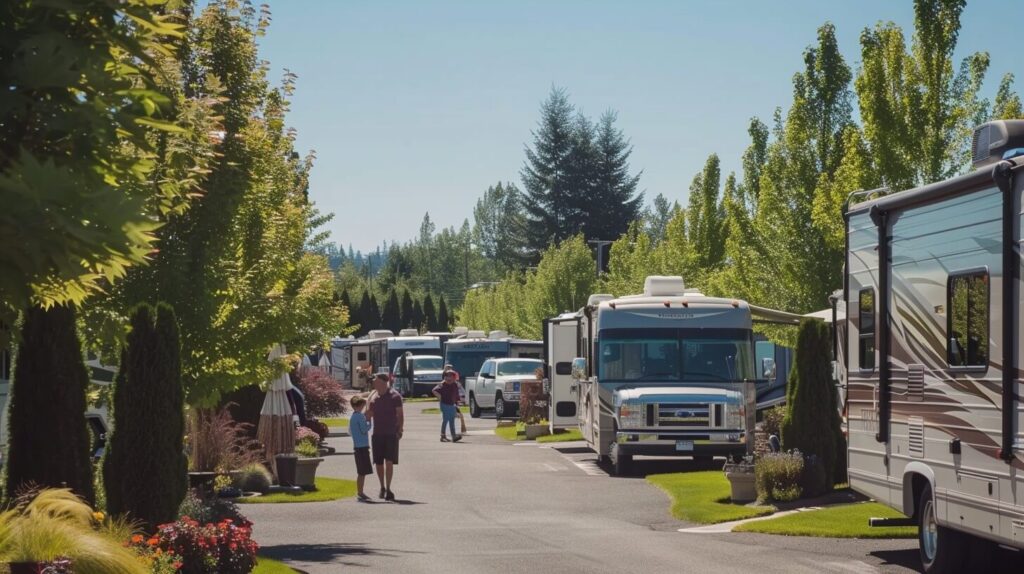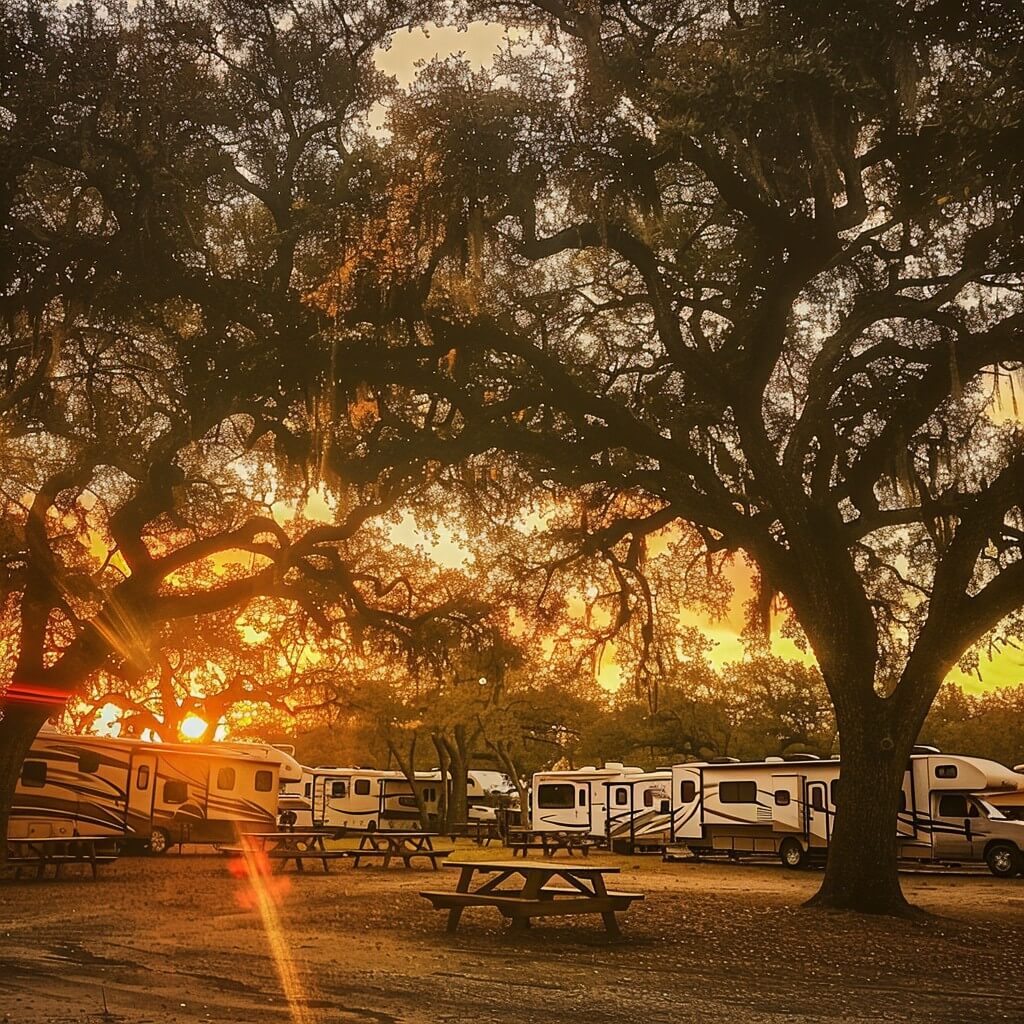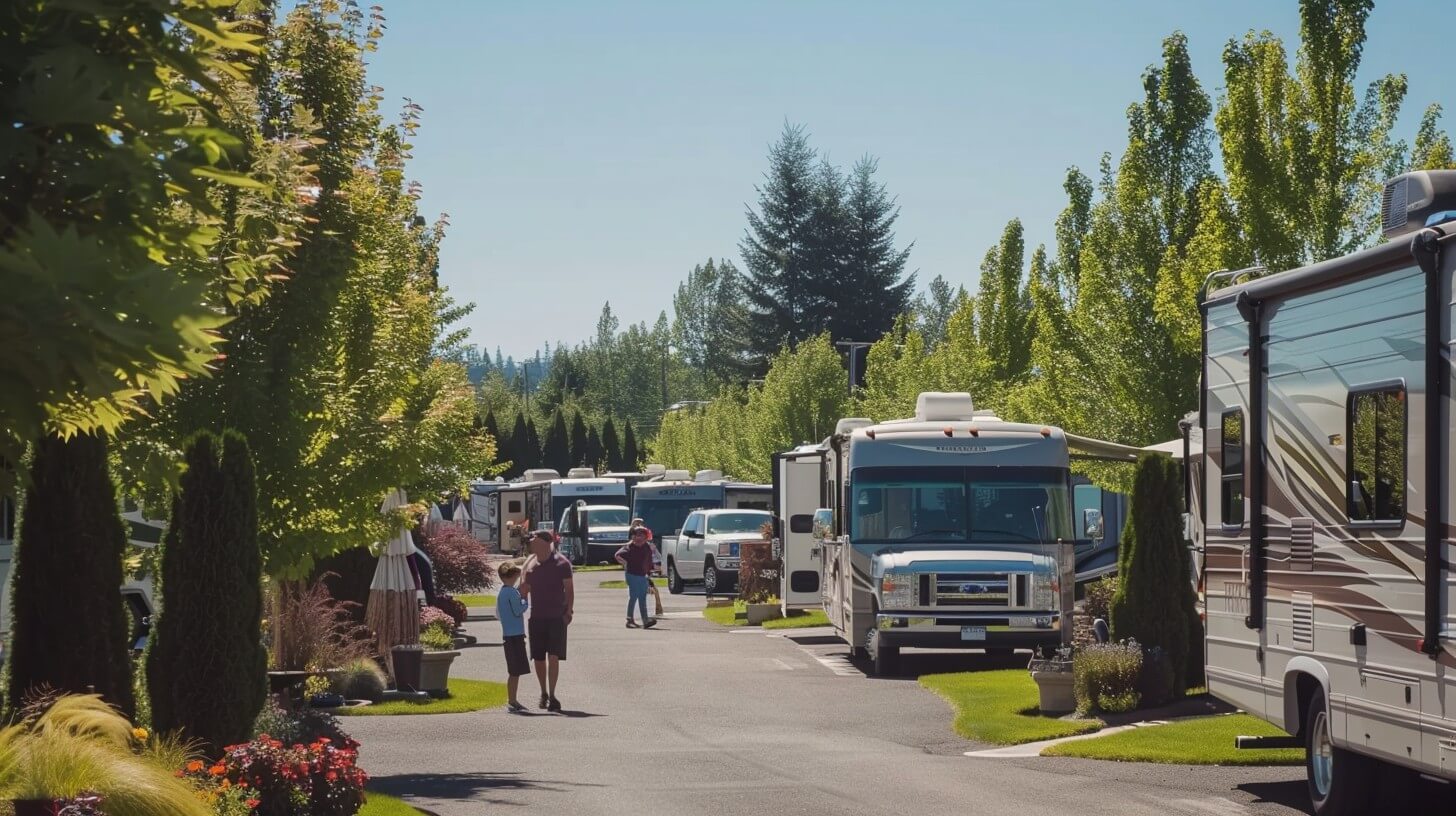Living the full-time RV life is a dream for many, but it often comes with financial challenges. To help you manage your finances effectively, here are some practical budgeting tips for RVers to ensure you can enjoy your travels without breaking the bank.
If you’re wondering how to save money on the road, you’re not alone! Many RVers share concerns about budgeting effectively while enjoying their travels.
In this guide, we’ll address common questions and provide practical tips to help you stretch your budget without sacrificing your adventures.

Common Questions Full-Time RVers Have
Before we dive into Budgeting Tips for RVers, let’s explore some common questions full-time RVers often have:
- How can I save on fuel costs?
- What are the best ways to find affordable campgrounds?
- How can I cut down on food expenses while traveling?
- What should I budget for maintenance and repairs?
- Are there any hidden costs I should be aware of?
- How can I plan for emergencies?
- What tools can help me budget effectively?
Budgeting Tips for RVers Basics for RV Life
Before diving into specific tips, it’s essential to set up a solid budget. A well-planned budget can help you feel more secure and allow you to enjoy your travels.
Here are some Budgeting Tips for RVers essentials:
Track Your Income and Expenses
The first step to Budgeting Tips for RVers effectively is tracking your income and expenses.
Use apps like Mint or YNAB (You Need A Budget) to monitor where your money goes each month.
These tools can help you identify areas where you can cut back.
For example, when we first hit the road, we were shocked to discover how much we were spending on dining out. By tracking our expenses, we realized that cooking our meals saved us hundreds of dollars each month. Keeping an eye on your spending can be eye-opening!
Set Realistic Goals
Determine how much you can spend each week or month and stick to it. Think of it like planning a trip—you wouldn’t leave without a map!
Here’s how to set realistic financial goals:
- Assess Your Income: Calculate your total income from all sources, including any side hustles or remote work.
- Identify Fixed and Variable Expenses: Fixed expenses might include RV loan payments and insurance, while variable expenses could be fuel and groceries.
- Create a Budgeting Spreadsheet: Use a simple spreadsheet or budgeting app to categorize your expenses. Consider categories like fuel, groceries, campground fees, and entertainment.
Create a Monthly Budget
Once you have your income and expenses tracked, it’s time to create your budget.
Break it down into monthly categories and set limits for each:
- Fuel: $300
- Campgrounds: $500
- Groceries: $400
- Entertainment: $200
- Miscellaneous: $100
Remember, these amounts may vary based on your travel plans and lifestyle.
The key is to keep your budget flexible enough to adjust as needed.
Fuel Savings Tips
Fuel is one of the biggest expenses for RVers.
Here are some strategies to keep those costs down:
Plan Your Route
Before hitting the road, take the time to plan your route. Use tools like Google Maps or RV-specific apps like RV Trip Wizard to find the most fuel-efficient routes and compare gas prices along the way. Planning can save you both time and money.
For example, when we traveled from the East Coast to the West Coast, we planned our stops at truck stops where fuel prices were generally lower.
By being strategic about our stops, we saved over $100 on fuel during the trip!
Use Fuel Rewards Programs
Many gas stations offer loyalty programs that provide discounts.
Sign up to save on every fill-up. Some popular fuel rewards programs include:
- Shell Fuel Rewards: Get discounts every time you fill up.
- BPme Rewards: Earn points towards fuel discounts.
- ExxonMobil Rewards: Redeem points for fuel savings or in-store items.
Combining these rewards with the best fuel prices can significantly lower your overall costs.
Maintain Your RV
Regular maintenance helps improve fuel efficiency. Keep tires inflated, replace air filters, and perform routine checks.
Here’s a checklist to help you stay on top of RV maintenance:
- Tire Pressure: Check your tire pressure regularly. Under-inflated tires can reduce fuel efficiency by 0.4% for every 1 psi drop.
- Air Filters: Clean or replace your air filter every few months. A clean filter can improve fuel economy by as much as 10%.
- Engine Checks: Schedule regular maintenance checks for your RV’s engine to ensure everything is running smoothly.
Finding Affordable Campgrounds
Camping fees can add up quickly, but there are several ways to find budget-friendly options:
Look for Free Campsites
Websites like Campendium list free and low-cost camping options.
Some public lands even allow you to camp for free! Additionally, consider the following options:
- Bureau of Land Management (BLM) Land: Many areas offer free camping; just be sure to follow the rules.
- National Forests: Dispersed camping is often allowed, providing a beautiful, natural setting for your stay.
- State Parks: While not always free, state parks usually have lower fees compared to private campgrounds.
Consider Membership Programs
Organizations like Good Sam and Passport America offer discounts on campgrounds for a small annual fee.
Memberships can pay for themselves quickly if you stay at multiple campgrounds throughout the year.
For instance, with a Good Sam membership, we saved over 10% on every campsite, which added up to substantial savings during our travels.
Use Apps
Download apps like Allstays or Campendium to search for campgrounds and read reviews from other RVers. These apps provide invaluable information about amenities, costs, and even local attractions.
Saving on Food Costs
Eating out can be tempting while on the road, but it can also drain your budget.
Here are ways to save on food expenses:
Cook Your Meals
Invest in a good portable stove or grill. Cooking while on the road not only saves money but can also be fun! My family often enjoys weekend cookouts at campsites—it’s a great way to bond.
Consider these tips for cooking in your RV:
- Meal Prep: Prepare meals in advance to make cooking easier during your travels. Freeze meals in portion sizes for quick, easy meals.
- Shop Smart: Buy groceries in bulk at warehouse stores like Costco or Sam’s Club to save on essentials.
- Use Seasonal Ingredients: Local farmers’ markets often have the freshest produce at better prices. Plus, you get to support local farmers!
Plan Your Meals
Create a meal plan before shopping. This helps you avoid impulse purchases and reduces food waste.
Here’s how to get started:
- Choose Recipes: Pick a few favorite recipes to keep things simple. Opt for meals that use similar ingredients to minimize waste.
- Make a Shopping List: Stick to your list to prevent impulse buys at the grocery store.
- Prep Ahead: Consider prepping some ingredients, like chopping vegetables, before your trip.
Avoid Dining Out
While it’s tempting to grab a meal while exploring new towns, dining out can quickly become a significant expense.
Here’s how to minimize eating out:
- Pack Snacks: Keep healthy snacks handy to avoid stopping for fast food. Trail mix, fruit, and granola bars travel well.
- Explore Local Cuisines at the Market: If you want to try local food, consider buying ingredients at local markets to make your own dishes.

Budgeting for Maintenance and Repairs
It’s crucial to set aside money for maintenance and repairs, as unexpected issues can arise:
Create a Maintenance Fund
Allocate a portion of your budget each month for maintenance and repairs. This way, you’ll be prepared when the inevitable wear and tear happens.
Consider the following tips:
- Estimate Annual Costs: Research the average costs of maintenance for your RV type and set aside that amount monthly.
- Emergency Fund: In addition to your maintenance fund, set up an emergency fund for unexpected repairs.
DIY When Possible
Many simple repairs can be done yourself.
YouTube is a treasure trove of how-to videos for RV maintenance! Here are a few common tasks you can handle:
- Changing the Oil: Learn how to change your RV’s oil and filter to save on labor costs.
- Replacing Lights: Upgrading to LED lights can reduce power consumption, and replacing bulbs is an easy DIY task.
- Minor Repairs: Patch small leaks and perform routine cleaning to extend the life of your RV.
Hidden Costs to Watch For
RVers often encounter unexpected expenses.
Here are some hidden costs to keep an eye on:
Insurance
Make sure to budget for RV insurance, which can vary greatly depending on your coverage.
Shop around for the best rates, and consider bundling insurance policies (like home and auto) for additional savings.
Tips for Finding Affordable RV Insurance:
- Compare Quotes: Use comparison websites to get quotes from multiple insurers.
- Consider Coverage Options: Assess your needs to determine what coverage is necessary versus optional.
Tolls and Fees
Factor in potential tolls and campground fees.
These can add up, especially on longer trips. Here are some tips for managing these costs:
- Use Toll Apps: Apps like Waze can help you avoid toll roads or suggest alternative routes.
- Budget for Fees: Research the areas you’ll be traveling through and add expected tolls to your budget.
Internet Access
If you rely on Wi-Fi for work or keeping in touch with family, consider how you’ll maintain connectivity.
Here are a few options to keep you connected without overspending:
- Mobile Hotspots: Invest in a mobile hotspot device with an unlimited data plan to stay connected wherever you are.
- Public Wi-Fi: Utilize free Wi-Fi at libraries, cafes, or campgrounds. Just be cautious about security and avoid sensitive transactions on public networks.
Budgeting Apps
- Mint: This free app links to your bank accounts, categorizes your spending, and provides an overview of your finances.
- YNAB (You Need A Budget): This app helps you allocate every dollar you earn, encouraging proactive budgeting.
- PocketGuard: This app shows how much disposable income you have after accounting for bills and necessities.
RV-Specific Apps
- GasBuddy: Find the cheapest gas prices near you.
- RV Trip Wizard: Plan your route, find campgrounds, and calculate fuel costs.
- Harvest Hosts: Stay overnight at unique locations like wineries and farms for a small annual fee.
Fuel-Efficient Driving Tips
Driving efficiently can also save you money on fuel.
Here are some practical tips:
Drive Steadily
Avoid rapid acceleration and hard braking, which can decrease your fuel efficiency. Instead, aim for smooth, steady driving.
Use Cruise Control
On long stretches of highway, use cruise control to maintain a consistent speed and save fuel.
Reduce Idle Time
Idling can waste a significant amount of fuel. Turn off your engine if you’ll be stopped for more than a minute.
Entertainment on a Budget
Enjoying your travels doesn’t have to break the bank.
Here are some budget-friendly entertainment ideas:
Explore Nature
Many of the best adventures are free! Hiking, swimming, and exploring national parks offer incredible experiences without the high cost.
Local Attractions
Check out local attractions and free events. Many towns offer free concerts, festivals, and community events.
Books and Games
Stock up on books, board games, and puzzles to enjoy during downtime. Libraries often have free books and DVDs available.
Healthcare on the Road
Staying healthy while traveling is essential.
Here are some tips for managing healthcare costs:
Telehealth Services
Many health insurance plans now offer telehealth services, which allow you to consult with a doctor via video call.
This can be more convenient and cost-effective than visiting a clinic.
Prescriptions
Plan ahead for prescription refills. Use services like GoodRx to find the lowest prices at pharmacies along your route.
Health Insurance
Ensure you have adequate health insurance that covers you in different states.
Some RVers choose health-sharing plans as a more affordable alternative.
Earning Money on the Road
Supplementing your income can help you manage your budget better.
Here are some ideas for earning money while traveling:
Remote Work
Many RVers work remotely. If you have a job that can be done from anywhere, make sure you have a reliable internet connection and a dedicated workspace in your RV.
Freelancing
Consider freelancing in your field of expertise. Websites like Upwork and Fiverr offer opportunities to find freelance gigs.
Seasonal Work
Some RVers take on seasonal jobs at campgrounds, national parks, or harvest sites. These jobs often come with the perk of free or discounted campsite fees.
Encouraging Reader Interaction
Engaging with your readers not only makes your content more valuable but also helps improve your search engine rankings.
Here are some ways to encourage interaction:
Pose Questions
Ask your readers questions at the end of your posts. For example, “What are your top tips for saving money on the road? Share in the comments below!”
Invite Comments
Encourage readers to leave comments with their own experiences and tips. Respond to comments to build a community.
Suggest Social Shares
Invite your readers to share your post on social media. You can say, “If you found these tips helpful, please share this post with fellow RVers!”
Keeping Content Up-to-Date
Regularly updating your content keeps it relevant and useful.
Here’s how to ensure your guide stays current:
Schedule Updates
Set a schedule to review and update your content every few months.
This could involve adding new tips, updating outdated information, or adjusting for changes in the RV lifestyle.
Add New Insights
As you continue your travels, you’ll gain new experiences and insights.
Share these with your readers to keep your content fresh and valuable.
Monitor Trends
Stay informed about trends in the RV community. Join forums, follow RV bloggers, and participate in social media groups to stay up-to-date with the latest tips and advice.
Conclusion
Budgeting Tips for RVers is key to enjoying the full-time RV lifestyle.
By tracking your expenses, planning your routes, finding affordable campgrounds, and making smart choices with food and entertainment, you can stretch your budget further and make the most of your travels.
Remember to stay prepared for emergencies, use tools and apps to help you stay on track, and engage with your community to share tips and advice.
Living on the road is an incredible adventure, and with these Budgeting Tips for RVers, you can ensure that your journey is both memorable and financially sustainable.
Happy travels!
Answer
What are effective Budgeting Tips for RVers strategies for full-time RV living?
To budget effectively, start by understanding your monthly expenses, which include campground fees, groceries, maintenance, and utilities.
Set a realistic budget that prioritizes essential expenses and allows for an emergency fund.
Regularly tracking your spending helps identify areas where you can cut back and save money.
How can I save on campground costs?
To minimize campground expenses, consider staying longer at each location to take advantage of weekly or monthly rates, which are often cheaper than nightly rates.
Additionally, seek out free parking options such as Walmart lots or public lands for dispersed camping.
What role does meal planning play in saving money on the road?
Meal planning is crucial as it helps control food costs. Preparing meals in your RV can significantly reduce dining expenses compared to eating out.
Budgeting for groceries and planning meals ahead ensures you stay within your food budget while enjoying home-cooked meals.
Are there specific RV memberships that can help with costs?
Yes, joining RV membership programs can provide discounts on campground fees and other services.
These memberships often offer access to exclusive campgrounds at reduced rates, which can lead to significant savings over time.
How can I manage unexpected expenses while RVing?
Establishing an emergency fund is vital for handling unexpected costs such as repairs or medical emergencies.
Aim to set aside at least three to six months’ worth of living expenses in this fund to provide financial security while traveling full-time
